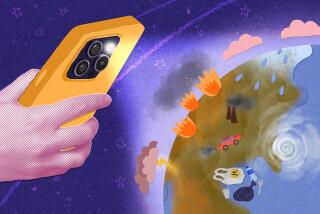Can’t visit this California aquarium? Chill with its emotional support squids from home
- Share via
When Avi Silver settles into work each morning, they usually put a YouTube video titled “2 Hours Of Chill Shrimp To Work/Study/Relax” on their living room TV.
“It has shrimp, it’s great, it’s so relaxing,” they said. “And then at the one hour and 22-minute mark, it gets inexplicably funky for about four minutes, and then goes back to being chill. It’s a whole experience.”
Silver, who works in publishing from their home in Hamilton, Canada, is one of the millions of people who have streamed the Monterey Bay Aquarium’s ambient and lo-fi videos, which fuse the aquarium’s livestreams with the popular low-fidelity hip-hop music that’s all over YouTube.

Emily Simpson, a senior social media content creator for the Monterey Bay Aquarium, said their team began making these videos in 2020 while the aquarium was closed.
“Especially when the pandemic hit, we had to pivot to a lot of new social outreach just to keep the aquarium’s presence front of mind,” Simpson said.
The aquarium’s first lo-fi video, “2 Hours Of Squid To Relax/Study/Work To,” was posted that August and has since become the third-most-popular video on its YouTube channel, with more than 2.3 million views.
“Everyone be quiet,” the video’s top comment reads, “I’m watching my emotional support squid.”
The videos are used in many ways: Simpson said that people have commented and messaged about how they play the videos while they’re sleeping, studying, meditating or even entertaining pets who are left home alone.
“There are hospitals that will broadcast the live cams in waiting rooms,” Simpson said, “and there are so many people who turn to those live cams to just have this really calm, almost meditative thing on in the background.”
“Everyone be quiet. I’m watching my emotional support squid.”
— YouTube commenter
Lo-fi music is often associated with Lofi Girl: the uber-famous YouTube channel that runs a 24/7 stream of lo-fi music set to an illustration of an animated girl wearing a green sweater and large over-ear headphones and calmly writing. With more than 11 million subscribers (and tens of thousands of people streaming at most hours of the day and night), it became national news when the Lofi Girl stream was removed for two days during July.
Griffin Candey, a doctoral candidate at the University of Michigan’s School of Music, Theatre & Dance, said that he came across the Monterey Bay Aquarium’s lo-fi videos while he was working on a paper about the lo-fi hip-hop community for his musicology class.
“This kind of hip-hop is not new,” Candey said as he traced aspects of the lo-fi subgenre back to Brian Eno’s 1978 album “Ambient 1: Music for Airports.” “But [the Lofi Girl] channel is kind of the primary disseminating voice.”
Candey likened contemporary lo-fi music to an Eno quote about how ambient music should “accommodate many levels of listening attention without enforcing one in particular; it must be as ignorable as it is interesting.”
“Because it has a very repetitive structure, or that kind of predictability, it’s not a thing that you have to actively use a lot of brain power on,” he said. “They just very easily blend into one another.”
But as lo-fi hip-hop grew from that ambient ethos, it was also heavily influenced by the work of the Detroit-born producer J Dilla and the Japanese producer Nujabes, who inspired the genre’s smooth and funky beats.
“Those two artists also use this technique called sidechain compression, which is basically when the kick drum of the kit hits, it reduces the volume of the rest of the instruments,” Candey said. “So the combination of asymmetrical beats, sidechain compression and the sampling digital media that brings natural imperfections into the music creates a kind of wavy texture, which is a very lo-fi thing.”
Some of the fuel behind YouTube’s many lo-fi streams is also the copyright-free lo-fi hubs like Lofi Girl and Chillhop (the library that the Monterey Bay Aquarium uses), which allow creators to use music for free as long as artists are credited.

The massive, diverse audiences for these ambient videos, which feature anything from bloody-belly comb jellyfish floating through dark water to Bart and Homer Simpson on a drive or SpongeBob enjoying a crisp autumn day, are also what drew Emily Simpson’s team (no relation to Bart or Homer) at the Monterey Bay Aquarium to make their lo-fi videos.
In Simpson’s eyes, these videos are a way for the aquarium to reach people who don’t often feel welcome in science-heavy spaces.
“Being on the internet and doing weird things like talking about ‘Animal Crossing’ and the animals that you can fish for in it, or creating these lo-fi videos, connects with so many young people who are consuming this kind of content,” Simpson said.
“Just kind of being there in a world that they’re already familiar with is so impactful,” they added. “And we get so many people who reach out to us just saying, ‘Oh, my gosh, I never thought that I would be a fan of an aquarium on Tumblr who’s making memes or listening to these lo-fi videos and just having squid or shrimp up in the background.’”
It must be as ignorable as it is interesting.
— Brian Eno, who coined the term “ambient music”
Silver, who watches these videos as they work from home, said the background noise can also be an essential tool for focusing.
“I have ADHD, and I have such a hard time balancing two things at once,” they said. “But I find it’s really good for my brain. Because it’s sort of the same few videos, I can rotate and have consistency while half-listening, so I find it’s been a really good access tool, honestly.”
But regardless of whether these fishy videos are used by viewers to sleep, survive chemistry 101 or just vibe, their effects seem to be overwhelmingly positive.
“Wow. This is truly the pinnacle of human creation,” one comment on the shrimp video reads. “The internet was made so I could chill alongside two shrimps.”
More to Read
Sign up for The Wild
We’ll help you find the best places to hike, bike and run, as well as the perfect silent spots for meditation and yoga.
You may occasionally receive promotional content from the Los Angeles Times.







